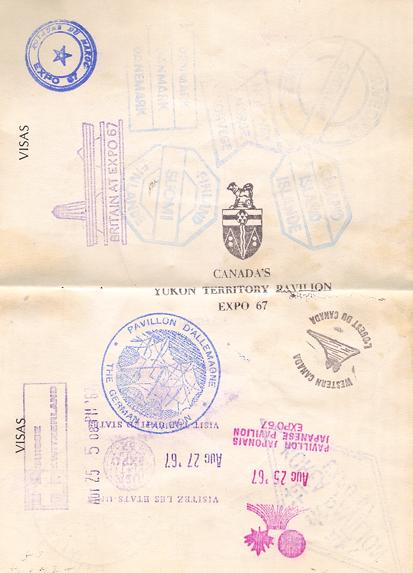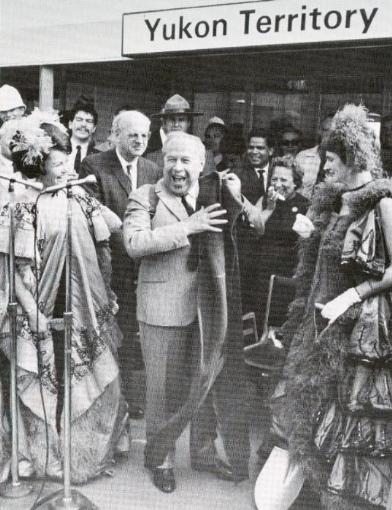
Yukon Territory insignia stamp on the
Expo 67 passport |
Introduction: Because the Yukon Pavilion was a late entry into
Expo 67, the Expo 67 Official Guide book did not have a
write-up about this pavilion. However, the following
description about the pavilion can be found in the "Expo 67
Montreal Canada" memorial book, Thomas Nelson & Sons (Canada),
1968.
Per square foot the Yukon Pavilion is
probably the busiest at Expo. It occupies two little rooms at the
end of a row of boutiques on Cité du Havre, and this tiny
participation, easily the smallest pavilion, has a stream of
visitors throughout the day. Inside, simple exhibits depict the
things for which the far-north Territory is famous.
Yukon
didn't have a building of its own at Expo because officials at
Whitehorse, the territorial capital, didn't decide to join Expo
until February, 1967. By then, the only space left at the price that
Yukon's population of 17,000 could afford was the end of a row of
shops in a service area.
But the delay and the smallness does
not hurt the Yukon Pavilion's popularity. For visitors, it is an
unexpected delight to find a participation with such unassuming
pride.
In the centre of the pavilion, of course, is gold
— gold nuggets
gleaming dully in a protective glass case. The pavilion walls show
more of the Yukon wealth: heads of sheep, caribou and deer, and
stuffed trout. Most prominent is the huge head of the largest moose
ever shot, its receding chin giving it a vacuous expression, its
glass eyes as dull as the gold.
On the walls also are the
verses from the poems of Robert Service, the "poet laureate of the
Klondike", and examples of mukluks and other hand-made leather
goods. A carved diamond willow tree shows the wildlife for which the
area is famous. Also on hand are the fairest products of the north
country, six hostesses right from the Yukon.
On August 17,
the anniversary of the first gold strike in the Yukon, the pavilion
had its own Discovery Day celebration. Chief hostess, Mrs. Shirley
Jensen, presented Commissioner General Dupuy with all the equipment
needed for him to become an "honorary prospector". He shouldered his
pack and pan, grasped his shovel, but, as the temperature climbed
above 80 degrees, he decided against trying on the pair of bright
read longjohns.
Bonus Feature 2011:
"Expo 67 and a special journey into the unknown"
̶
by Bob Carswell
|

